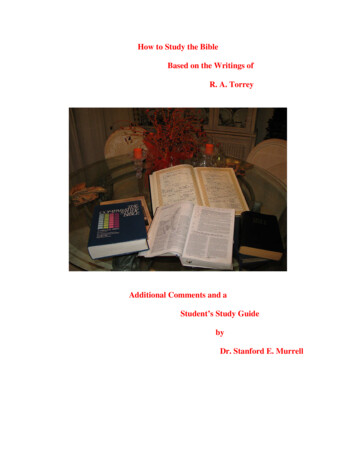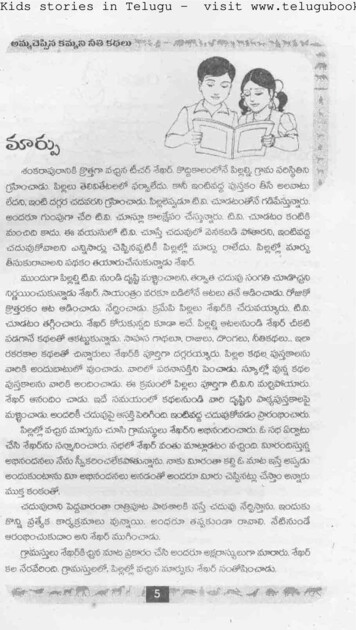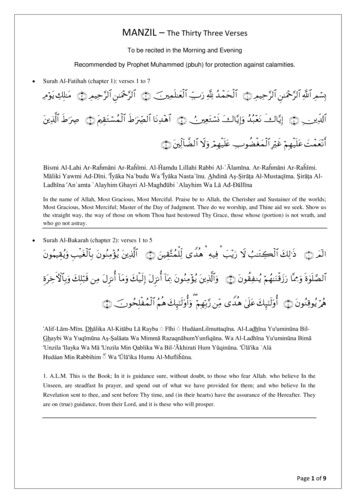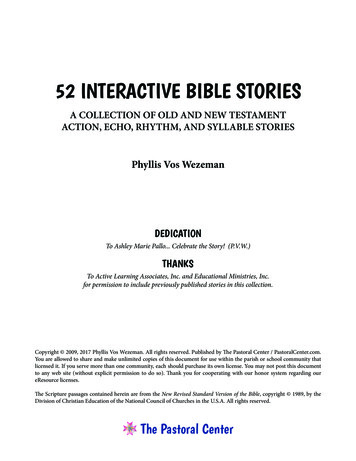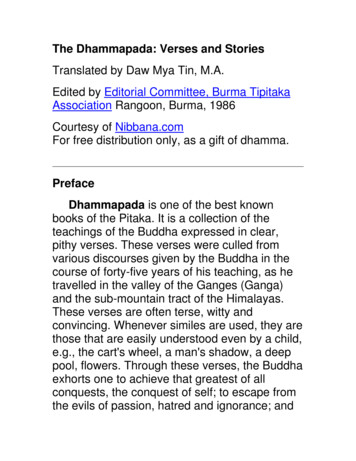
Transcription
The Dhammapada: Verses and StoriesTranslated by Daw Mya Tin, M.A.Edited by Editorial Committee, Burma TipitakaAssociation Rangoon, Burma, 1986Courtesy of Nibbana.comFor free distribution only, as a gift of dhamma.PrefaceDhammapada is one of the best knownbooks of the Pitaka. It is a collection of theteachings of the Buddha expressed in clear,pithy verses. These verses were culled fromvarious discourses given by the Buddha in thecourse of forty-five years of his teaching, as hetravelled in the valley of the Ganges (Ganga)and the sub-mountain tract of the Himalayas.These verses are often terse, witty andconvincing. Whenever similes are used, they arethose that are easily understood even by a child,e.g., the cart's wheel, a man's shadow, a deeppool, flowers. Through these verses, the Buddhaexhorts one to achieve that greatest of allconquests, the conquest of self; to escape fromthe evils of passion, hatred and ignorance; and
to strive hard to attain freedom from craving andfreedom from the round of rebirths. Each versecontains a truth (dhamma), an exhortation, apiece of advice.Dhammapada VersesDhammapada verses are often quoted bymany in many countries of the world and thebook has been translated into many languages.One of the earliest translations into English wasmade by Max Muller in 1870. Other translationsthat followed are those by F.L. Woodward in1921, by Wagismara and Saunders in 1920, andby A.L. Edmunds (Hymns of the Faith) in 1902.Of the recent translations, that by NaradaMahathera is the most widely known. Dr.Walpola Rahula also has translated someselected verses from the Dhammapada and hasgiven them at the end of his book "What theBuddha Taught," revised edition. The Chinesetranslated the Dhammapada from Sanskrit. TheChinese version of the Dhammapada wastranslated into English by Samuel Beal (Textsfrom the Buddhist Canon known asDhammapada) in 1878.In Burma, translations have been made intoBurmese, mostly in prose, some with
paraphrases, explanations and abridgements ofstories relating to the verses. In recent years,some books on Dhammapada with bothBurmese and English translations, together withPali verses, have also been published.The Dhammapada is the second book of theKhuddaka Nikaya of the Suttanta Pitaka,consisting of four hundred and twenty-threeverses in twenty-six chapters arranged undervarious heads. In the Dhammapada areenshrined the basic tenets of the Buddha'sTeaching.Verse (21) which begins with "Appamadoamatapadam" meaning "Mindfulness is the wayto Nibbana, the Deathless," is a very importantand significant verse. Mindfulness is the mostimportant element in Tranquillity and InsightMeditation. The last exhortation of the Buddhajust before he passed away was also to bemindful and to endeavour diligently (to completethe task of attaining freedom from the round ofrebirths through Magga and Phala). It isgenerally accepted that it was on account of thisverse on mindfulness that the Emperor Asoka ofIndia and King Anawrahta of Burma becameconverts to Buddhism. Both kings had helped
greatly in the propagation of Buddhism in theirrespective countries.In verse (29) the Buddha has coupled his callfor mindfulness with a sense of urgency. Theverse runs: "Mindful amongst the negligent,highly vigilant amongst the drowsy, the wiseman advances like a race horse, leaving thejade behind."Verses (1) and (2) illustrate the immutablelaw of Kamma, under which every deed, good orbad, comes back to the doer. Here, the Buddhaemphasizes the importance of mind in all ouractions and speaks of the inevitableconsequences of our deeds, words andthoughts.Verses (153) and (154) are expressions ofsublime and intense joy uttered by the Buddhaat the very moment of his Enlightenment. Thesetwo verses give us a graphic account of theculmination of the Buddha's search for Truth.They tell us about the Buddha finding the'house-builder,' Craving, the cause of repeatedbirths in Samsara. Having rid of Craving, for himno more houses (khandhas) shall be built byCraving, and there will be no more rebirths.
Verses (277), (278) and (279) are alsoimportant as they tell us about the impermanent,unsatisfactory and the non-self nature of allconditioned things; it is very important that oneshould perceive the true nature of all conditionedthings and become weary of the khandhas, forthis is the Path to Purity.Then the Buddha shows us the Path leadingto the liberation from round of rebirths, i.e., thePath with eight constituents (Atthangiko Maggo)in Verse (273). Further, the Buddha exhorts usto make our own effort in Verse (276)saying, "You yourselves should make the effort,the Tathagatas only show the way." Verse (183)gives us the teaching of the Buddhas. Itsays, "Do no evil, cultivate merit, purify one'smind; this is the teaching of the Buddhas."In Verse (24) the Buddha shows us the wayto success in life, thus: "If a person is energetic,mindful, pure in thought, word and deed, if hedoes everything with care and consideration,restrains his senses; earns his living accordingto the Dhamma and is not unheedful, then, thefame and fortune of that mindful personincrease."
These are some of the examples of the gemsto be found in the Dhammapada. Dhammapadais, indeed, a philosopher, guide and friend to all.This translation of verses is from Pali intoEnglish. The Pali text used is the DhammapadaPali approved by the Sixth International BuddhistSynod. We have tried to make the translation asclose to the text as possible, but sometimes it isvery difficult, if not impossible, to find an Englishword that would exactly correspond to a Paliword. For example, we cannot yet find a singleEnglish word that can convey the real meaningof the word "dukkha" used in the exposition ofthe Four Noble Truths. In this translation,wherever the term "dukkha" carries the samemeaning as it does in the Four Noble Truths, it isleft untranslated; but only explained.When there is any doubt in the interpretationof the dhamma concept of the verses or whenthe literal meaning is vague or unintelligible, wehave referred to the Commentary (in Pali) andthe Burmese translation of the Commentary bythe Nyaunglebin Sayadaw, a very learned thera.On many occasions we have also consulted theteachers of the Dhamma (Dhammacariyas) forelucidation of perplexing words and sentences.
In addition we have also consulted Burmesetranslations of the Dhammapada, especially thetranslation by the Union Buddha SasanaCouncil, the translation by the Sangaja Sayadaw(1805-1876), a leading Maha thera in the time ofKing Mindon and King Thibaw, and also thetranslation by Sayadaw U Thittila, anOvadacariya Maha thera of the Burma PitakaAssociation. The book by the Sangaja Sayadawalso includes paraphrases and abridgements ofthe Dhammapada stories.Dhammapada StoriesSummaries of the Dhammapada stories aregiven in the second part of the book as it isgenerally believed that the DhammapadaCommentary written by Buddhaghosa (5thcentury A.D.) is a great help towards a betterunderstanding of the Dhammapada. Threehundred and five stories are included in theCommentary. Most of the incidents mentioned inthe stories took place during the life-time of theBuddha. In some stories, some facts aboutsome past existences were also retold.In writing summaries of stories we have nottried to translate the Commentary. We havesimply culled the facts of the stories and have
rewritten them briefly: A translation of the versesis given at the end of each story.It only remains for me now to express mydeep and sincere gratitude to the members ofthe Editorial Committee, Burma PitakaAssociation, for having meticulously gonethrough the script; to Sayagyi Dhammacariya UAung Moe and to U Thein Maung, editor, BurmaPitaka Association, for helping in the translationof the verses.May the reader find the Path to Purity.Daw Mya Tin20th April, 1984Burma Pitaka AssociationEditorial CommitteeDoctrinal Sayadaw U Kumara, BA,Adviser Dhammcariya (Siromani,Vatamsaka).Chairman U Shwe Mra, BA., I.C.S. Retd.,Former Special Adviser, PublicAdministration Division, E.S.A.,
United Nations Secretariat.Members U Chan Htoon, LL.B., Barristerat-law;Former President, WorldFellowship of Buddhists.U Nyun, B.A., I.C.S. Retd.,Former Executive Secretary,United Nations EconomicCommission for Asia and the FarEast;Vice-President, World Fellowshipof Buddhists.U Myint Too, B.Sc., B.L.,Barrister-at-law,Vice-President, All BurmaBuddhist Association.Daw Mya Tin, M.A.,Former Head of GeographyDepartment, Institute ofEducation, Rangoon.Doctrinal U Kyaw Htut, Dhammacariya;Consultant Former Editor-in-chief of theBoard for Burmese Translation ofthe Sixth Synod Pali Texts.
Editors U Myo Min, M.A., B.L.,Former Professor of English,Rangoon University.U Thein Maung, B.A., B.LU Hla Maung, B.A., B.L.Secretary U Tin Nwe, B.Sc.I.YamakavaggaDhammapada Verse 1Cakkhupalatthera VatthuManopubbangama dhamma1manosettha manomayamanasa ce padutthena2bhasati va karoti vatato nam dukkhamanveticakkamva vahato padam.Verse 1: All mental phenomena have mind astheir forerunner; they have mind as their chief;they are mind-made. If one speaks or acts with
an evil mind, 'dukkha' 3 follows him just as thewheel follows the hoofprint of the ox that drawsthe cart.1. manopubbangama dhamma: All mentalphenomena have Mind as their forerunner in thesense that Mind is the most dominant, and it isthe cause of the other three mental phenomena,namely, Feeling (vedana), Perception (sanna)and Mental Formations or Mental Concomitants(sankhara). These three have Mind orConsciousness (vinnana) as their forerunner,because although they arise simultaneously withMind they cannot arise if Mind does not arise.(The Commentary)2. manasa ce padutthena (Verse 1) and manasice pasannena (Verse 2): Manasa here meansintention or volition (cetana); volition leads oneto the performance of volitional actions, bothgood and evil. This volition and the resultantactions constitute kamma; and kamma alwaysfollows one to produce results. Cakkhupala'sblindness (Verse 1) was the consequence of hishaving acted with an evil intention in a previousexistence and Matthakundali's happy existencein Tavatimsa celestial world (Verse 2) was the
result of his mental devotion (manopasada) tothe Buddha.3. dukkha: In this context, dukkha menssuffering, or physical or mental pain, misfortune,unsatisfactoriness, evil consequences, etc., andrebirth in the lower planes of existence or in thelower strata of human society if born in thehuman world.The Story of Thera CakkhupalaWhile residing at the Jetavana monastery inSavatthi, the Buddha uttered Verse (1) of thisbook, with reference to Cakkhupala, a blindthera.On one occasion, Thera Cakkhupala came topay homage to the Buddha at the Jetavanamonastery. One night, while pacing up anddown in meditation, the thera accidentallystepped on some insects. In the morning, somebhikkhus visiting the thera found the deadinsects. They thought ill of the thera andreported the matter to the Buddha. The Buddhaasked them whether they had seen the therakilling the insects. When they answered in thenegative, the Buddha said, "Just as you had not
seen him killing, so also he had not seen thoseliving insects. Besides, as the thera had alreadyattained arahatship he could have no intention ofkilling and so was quite innocent." On beingasked why Cakkhupala was blind although hewas an arahat, the Buddha told the followingstory:Cakkhupala was a physician in one of his pastexistences. Once, he had deliberately made awoman patient blind. That woman had promisedhim to become his slave, together with herchildren, if her eyes were completely cured.Fearing that she and her children would have tobecome slaves, she lied to the physician. Shetold him that her eyes were getting worse when,in fact, they were perfectly cured. The physicianknew she was deceiving him, so in revenge, hegave her another ointment, which made hertotally blind. As a result of this evil deed thephysician lost his eyesight many times in hislater existences.Then the Buddha spoke in verse as follows:Verse 1: All mental phenomena have mind astheir forerunner; they have mind as their chief;they are mind-made. If one speaks or acts withan evil mind, 'dukkha' follows him just as the
wheel follows the hoofprint of the ox that drawsthe cart.At the end of the discourse, thirty thousandbhikkhus attained arahatship together withAnalytical Insight (Patisambhida).Dhammapada Verse 2Matthakundali VatthuManopubbangama dhammamanosettha manomayamanasa ce pasannenabhasati va karoti vatato nam sukha1 manvetichayava anapayini.Verse 2: All mental phenomena have mind astheir forerunner; they have mind as their chief;they are mind-made. If one speaks or acts with apure mind, happiness (sukha) follows him like ashadow that never leaves him.1. Sukham/sukha: in this context, happiness,satifactoriness, fortune, etc., and rebirth in thethree upper planes of happy existence.
The Story of MatthakundaliWhile residing at the Jetavana monastery inSavatthi, the Buddha uttered Verse (2) of thisbook, with reference to Matthakundali, a youngBrahmin. Matthakundali was a young brahmin,whose father, Adinnapubbaka, was very stingyand never gave anything in charity. Even thegold ornaments for his only son were made byhimself to save payment for workmanship. Whenhis son fell ill, no physician was consulted, until itwas too late. When he realized that his son wasdying, he had the youth carried outside on to theverandah, so that people coming to his housewould not see his possessions.On that morning, the Buddha arising early fromhis deep meditation of compassion saw, in hisNet of Knowledge, Matthakundali lying on theverandah. So when entering Savatthi for almsfood with his disciples, the Buddha stood nearthe door of the brahmin Adinnapubbaka. TheBuddha sent forth a ray of light to attract theattention of the youth, who was facing theinterior of the house. The youth saw the Buddha;and as he was very weak he could only professhis faith mentally. But that was enough. Whenhe passed away with his heart in devotion to the
Buddha he was reborn in the Tavatimsa celestialworld.From his celestial abode the youngMatthakundali, seeing his father mourning overhim at the cemetery, appeared to the old man inthe likeness of his old self. He told his fatherabout his rebirth in the Tavatimsa world and alsourged him to approach and invite the Buddha toa meal. At the house of Adinnapubbaka thequestion of whether one could or could not bereborn in a celestial world simply by mentallyprofessing profound faith in the Buddha, withoutgiving in charity or observing the moral precepts,was brought up. So the Buddha willed thatMatthakundali should appear in person;Matthakundali soon appeared fully decked withcelestial ornaments and told them about hisrebirth in the Tavatimsa world. Then only, theaudience became convinced that the son of thebrahmin Adinnapubbaka by simply devoting hismind to the Buddha had attained much glory.Then the Buddha spoke in verse as follows:Verse 2: All mental phenomena have mind astheir forerunner; they have mind as their chief;they are mind-made. If one speaks or acts with apure mind, happiness (sukha) follows him like a
shadow that never leaves him.At the end of the discourse Matthakundali andhis father Adinnapubbaka attained SotapattiMagga and Sotapatti Phala. Adinnapubbakaalso donated almost all his wealth to the causeof the Buddha's Teaching.Dhammapada Verses 3 and 4Tissatthera VatthuAkkocchi mam avadhi mamajini mam ahasi meye ca tam upanayhantiveram tesam na sammati.Akkocchi mam avadhi mamajini mam ahasi meye ca tam nupanayhantiveram tesupasammati.Verse 3: "He abused me, he ill-treated me, hegot the better of me, he stole my belongings;".the enmity of those harbouring such thoughtscannot be appeased.Verse 4: "He abused me, he ill-treated me, hegot the better of me, he stole my belongings;".the enmity of those not harbouring suchthoughts can be appeased.
The Story of Thera TissaWhile residing at the Jetavana monastery inSavatthi, the Buddha uttered Verses (3) and (4)of this book, with reference to Thera Tissa.Tissa, son of the Buddha's maternal aunt, was atone time staying with the Buddha. He hadbecome a bhikkhu only in his old age, but heposed as a senior bhikkhu and was very pleasedwhen visiting bhikkhus asked his permission todo some service for him. On the other hand, hefailed to perform the duties expected of juniorbhikkhus; besides, he often quarrelled with theyounger bhikkhus. Should anyone rebuke himon account of his behaviour he would gocomplaining to the Buddha, weeping, very muchdissatisfied and very upset. The others alsofollowed him to the presence of the Buddha. TheBuddha told them not to harbour thoughts ofenmity, for enmity could only be appeased bynot harbouring enmity.Then the Buddha spoke in verse as follows:Verse 3: "He abused me, he ill-treated me, hegot the better of me, he stole my belongings;".
the enmity of those harbouring such thoughtscannot be appeased.Verse 4: "He abused me, he ill-treated me, hegot the better of me, he stole my belongings;".the enmity of those not harbouring suchthoughts can be appeased.At the end of the discourse, one hundredthousand bhikkhus attained Sotapatti Fruition.Dhammapada Verse 5Kalayakkhini VatthuNa hi verena veranisammantidha kudacanamaverena ca sammantiesa dhammo sanantano.1Verse 5: Hatred is, indeed, never appeased byhatred in this world. It is appeased only byloving-kindness. This is an ancient law.1. esa dhammo sanantano: This is the same as"poranako dhammo," the doctrine followed bythe Budhha and his disciples. The exhortation is
not to return hatred for hatred but to conquer itby loving-kindness (absence of hatred).The Story of KalayakkhiniWhile residing at the Jetavana monastery inSavatthi, the Buddha uttered Verse (5) of thisbook, with reference to a certain woman whowas barren, and her rival.Once there lived a householder, whose wife wasbarren; later he took another wife. The feudstarted when the elder wife caused abortion ofthe other one, who eventually died in child birth.In later existences the two were reborn as a henand a cat; a doe and a leopardess; and finally asthe daughter of a nobleman in Savatthi and anogress named Kali. The ogress (Kalayakkhini)was in hot pursuit of the lady with the baby,when the latter learned that the Buddha wasnearby, giving a religious discourse at theJetavana monastery. She fled to him and placedher son at his feet for protection. The ogresswas stopped at the door by the guardian spirit ofthe monastery and was refused admission. Shewas later called in and both the lady and theogress were reprimanded by the Buddha. The
Buddha told them about their past feuds as rivalwives of a common husband, as a cat and ahen, and as a doe and a leopardess. They weremade to see that hatred could only cause morehatred, and that it could only cease throughfriendship, understanding and goodwill.Then the Buddha spoke in verse as follows:Verse 5: Hatred is, indeed, never appeased byhatred in this world. It is appeased only byloving-kindness. This is an ancient law.At the end of the discourse, the ogress wasestablished in Sotapatti Fruition and the longstanding feud came to an end.Dhammapada Verse 6Kosambaka VatthuPare ca na vijananti1mayamettha yamamase2ye ca tattha vijananti3tato sammanti medhaga.Verse 6: People, other than the wise, do notrealize, "We in this world must all die," (and, notrealizing it, continue their quarrels). The wiserealize it and thereby their quarrels cease.
1. Pare ca na vijananti: 'Pare' means 'others'; inthis context, people other than the wise. Thesepeople do not realize that they must die, andbehave as if they were never going to die andkeep on quarrelling. Therefore, they aresometimes referred to as the ignorant or thefoolish, or those who are not worthy of love andrespect.2. mayamettha yamamase: lit., "We here mustdie," meaning we, of this world, must die; or allmen are mortal.3. ye ca tattha vijananti: in the case of those whounderstand, meaning the wise. The wiseunderstand (or realize) that all men are mortal.The Story of Kosambi BhikkhusWhile residing at the Jetavana monastery inSavatthi, the Buddha uttered Verse (6) of thisbook, with reference to the bhikkhus of Kosambi.The bhikkhus of Kosambi had formed into twogroups. One group followed the master ofVinaya and the other followed the teacher of the
Dhamma and they were often quarrelling amongthemselves. Even the Buddha could not stopthem from quarrelling; so he left them and spentthe vassa, residence period of the rains, allalone in Rakkhita Grove near Palileyyaka forest.There, the elephant Palileyya waited upon theBuddha.The lay disciples of Kosambi, on learning thereason for the departure of the Buddha, refusedto make offerings to the remaining bhikkhus.This made them realize their mistake andreconciliation took place among themselves.Still, the lay disciples would not treat them asrespectfully as before, until they owned up theirfault to the Buddha. But the Buddha was awayand it was in the middle of the vassa; so thebhikkhus of Kosambi spent the vassa in miseryand hardship.At the end of the vassa, the Venerable Anandaand five hundred bhikkhus approached theBuddha and gave the message fromAnnathapindika and other lay disciples imploringhim to return. In due course the Buddhareturned to the Jetavana monastery in Savatthi.The bhikkhus followed him there, fell down at hisfeet, and owned up their fault. The Buddha
rebuked them for disobeying him. He told themto remember that they must all die some dayand therefore, they must stop their quarrels andmust not act as if they would never die.Then the Buddha spoke in verse as follows:Verse 6: People, other than the wise, do notrealize, "We in this world must all die," (and, notrealizing it, continue their quarrels). The wiserealize it and thereby their quarrels cease.At the end of the discourse, all the assembledbhikkhus were established in Sotapatti Fruition.Dhammapada Verses 7 and 8Mahakalatthera VatthuSubhanupassim viharantamindriyesu asamvutambhojanamhi camattannumkusitam hinaviriyamtam ve pasahati Maro1vato rukkhamva dubbalam.Asubhanupassim viharantamindriyesu susamvutambhojanamhi ca mattannumsaddham2 araddhaviriyam
tam ve nappasahati Marovato selamva pabbatam.Verse 7: He who keeps his mind on pleasantobjects, who is uncontrolled in his senses,immoderate in his food, and is lazy and lackingin energy, will certainly be overwhelmedby Mara,3 just as stormy winds uproot a weaktree.Verse 8: He who keeps his mind on theimpurities (of the body), who is well-controlled inhis senses and is full of faith and energy, willcertainly be not overwhelmed by Mara, just asstormy winds cannot shake a mountain of rock.1. Maro/Mara: in this context kilesamara, thedefilements hindering the realization of Nibbana.2. saddham/saddha: According to theCommentary,(a) unwavering (unshakable) faith in the Buddha,the Dhamma (the Doctrine) and the Samgha(the Buddhist Religious Order) and(b) faith or belief in kamma (action) and itsresults.3. Refer to 1.
The Story of Thera MahakalaWhile residing in the neighbourhood of the townof Setabya, the Buddha uttered Verses (7) and(8) of this book, with reference to Mahakala andhis brother Culakala. Mahakala and Culakalawere two merchant brothers from the town ofSetabya. While travelling about with theirmerchandise on one occasion, they had achance to listen to a religious discourse given bythe Buddha. After hearing the discourseMahakala asked the Buddha for admission tothe Order of the bhikkhus. Culakala also joinedthe Order but with the intention of coming out ofthe Order and to bring out his brother along withhim.Mahakala was serious in his ascetic practice atthe cemetery (Sosanika dhutinga) and diligentlymeditated on decay and impermanence. Hefinally gained Insight and attained arahatship.Later, the Buddha and his disciples, includingthe brothers, happened to be staying in theforest of Simsapa, near Setabya. While stayingthere, the former wives of Culakala invited theBuddha and his disciples to their house.
Culakala himself went ahead to prepare seatingarrangements for the Buddha and his disciples.Once there, the former wives of Culakala madehim change into lay clothes.The next day, the wives of Mahakala invited theBuddha and his disciples to their house hopingto do the same with Mahakala as the wives ofCulakala had done to Culakala. After the mealthey requested the Buddha to let Mahakalaremain to "express appreciation" (anumodana).So the Buddha and the other disciples left.Arriving at the village gate the bhikkhusexpressed their dissatisfaction andapprehension. They were dissatisfied becauseMahakala was permitted to stay behind and theywere afraid that, like Culakala, his brother,Mahakala, too, would be made to leave theOrder by his former wives. To this, the Buddhareplied that the two brothers were not alike.Culakala indulged in sensual pleasures and waslazy and weak; he was just like a weak tree.Mahakala, on the other hand, was diligent,steadfast and strong in his faith of the Buddha,the Dhamma and the Samgha; he was like amountain of rock.Then the Buddha spoke in verse as follows:
Verse 7: He who keeps his mind on pleasantobjects, who is uncontrolled in his senses,immoderate in his food, and is lazy and lackingin energy, will certainly be overwhelmedby Mara, just as stormy winds uproot a weaktree.Verse 8: He who keeps his mind on theimpurities (of the body), who is well-controlled inhis senses and is full of faith and energy, willcertainly be not overwhelmed by Mara, just asstormy winds cannot shake a mountain of rock.Meanwhile, the former wives of Mahakalasurrounded him and tried to remove his yellowrobes. The thera, sensing their attitude, stood upand rising up into the air by his supernormalpowers passed through the roof of the houseinto the sky. He landed at the feet of the Buddhaat the very moment the Master was coming tothe end of his utterance of the above twostanzas. At the same time, all the bhikkhusassembled there were established in SotapattiFruition.Dhammapada Verses 9 and 10Devadatta Vatthu
Anikkasavo kasavam1yo vattham paridahissatiapeto damasaccenana so kasavamarahati.Yo ca vantakasav'assa2silesu susamahitoupeto damasaccenasa ve kasavamarahati.Verse 9: He who is not free from taints of moraldefilements (kilesas) and yet dons the yellowrobe, who lacks restraint in his senses and(speaks not the) truth is unworthy of the yellowrobe.Verse 10: He who has discarded all moraldefilements (kilesas), who is established inmoral precepts, is endowed with restraint and(speaks the) truth is, indeed, worthy of theyellow robe.1. kasavam or kasavam vattham: the yellow orreddish yellow robe donned by members of theBuddhist Religious Order. There is a play onwords in the above stanzas; 'anikkasavo',meaning, not free from faults of moraldefilements and therefore, stained;
and kasavam, the yellow robe, dyed sombre insome astringent juice and is therefore stained.2. vantakasav'assa: lit., has vomited all moraldefilements; it means, has discarded all moraldefilements through the four Path Knowledge(Magga nana).The Story of DevadattaWhile residing at the Jetavana monastery inSavatthi, the Buddha uttered Verses (9) and (10)of this book, with reference to Devadatta.Once the two Chief Disciples, the VenerableSariputta and the Venerable Maha Moggallana,went from Savatthi to Rajagaha. There, thepeople of Rajagaha invited them, with their onethousand followers, to a morning meal. On thatoccasion someone handed over a piece of cloth,worth one hundred thousand, to the organizersof the alms-giving ceremony. He instructed themto dispose of it and use the proceeds for theceremony should there be any shortage offunds, or if there were no such shortage, to offerit to anyone of the bhikkhus they thought fit. It sohappened that there was no shortage ofanything and the cloth was to be offered to one
of the theras. Since the two Chief Disciplesvisited Rajagaha only occasionally, the clothwas offered to Devadatta, who was a permanentresident of Rajagaha.Devadatta promptly made the cloth into robesand moved about pompously, wearing them.Then, a certain bhikkhu from Rajagaha came toSavatthi to pay homage to the Buddha, and toldhim about Devadatta and the robe, made out ofcloth worth one hundred thousand. The Buddhathen said that it was not the first time thatDevadatta was wearing robes that he did notdeserve. The Buddha then related the followingstory.Devadatta was an elephant hunter in one of hisprevious existences. At that time, in a certainforest, there lived a large number of elephants.One day, the hunter noticed that theseelephants knelt down to the paccekabuddhas*on seeing them. Having observed that, thehunter stole an upper part of a yellow robe andcovered his body and hand with it. Then, holdinga spear in his hand, he waited for the elephantson their usual route. The elephants came, andtaking him for a paccekabuddha fell down ontheir knees to pay obeisance. They easily fell
prey to the hunter. Thus, one by one, he killedthe last elephant in the row each day for manydays.The Bodhisatta (the Buddha-to-be) was then theleader of the herd. Noticing the dwindlingnumber of his followers he decided toinvestigate and followed his herd at the end ofthe line. He was alert, and was therefore able toevade the spear. He caught hold of the hunter inhis trunk and was about to dash him against theground, when he saw the yellow robe. Seeingthe yellow robe, he desisted and spared the lifeof the hunter.The hunter was rebuked for trying to kill undercover of the yellow robe and for commuting suchan act of depravity. The hunter clearly did notdeserve to put on the yellow robe.Then the Buddha spoke in verse as follows:Verse 9: He who is not free from taints of moraldefilements (kilesas) and yet dons the yell
amatapadam" meaning "Mindfulness is the way to Nibbana, the Deathless," is a very important and significant verse. Mindfulness is the most important element in Tranquillity and Insight Meditation. The last exhortation of the Buddha just before he passed away was al
